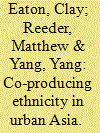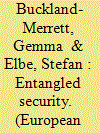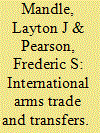|
|
|
Sort Order |
|
|
|
Items / Page
|
|
|
|
|
|
|
| Srl | Item |
| 1 |
ID:
193124


|
|
|
|
|
| Summary/Abstract |
The articles in this special issue examine engagements across ethnic boundaries in Asian cities over the past two centuries. We see these cities as stages for the co-production of ethnicity, where multiple actors, including but not limited to state authorities, have attempted to define, manage, and challenge the social boundaries between their diverse inhabitants. These articles direct our attention to the convergence of three critical themes: the flexibility and ubiquity of ethnic ascription, the top-down and bottom-up co-production of social meaning, and Asian cities as crucial sites of social innovation.
|
|
|
|
|
|
|
|
|
|
|
|
|
|
|
|
| 2 |
ID:
165328


|
|
|
|
|
| Summary/Abstract |
This article advances a new account of security as an intensely relational and ontologically entangled phenomenon that does not exist prior to, nor independently of, its intra-action with other phenomena and agencies. Security's ‘entanglement’ is demonstrated through an analysis of the protracted security concerns engendered by ‘dangerous’ scientific experiments performed with lethal H5N1 flu viruses. Utilising methodological approaches recently developed in the field of Science and Technology Studies (STS), the article explicates the intensely ‘co-productive’ dynamics at play between security and science in those experiments, and which ultimately reveal security to be a deeply relational phenomenon continuously emerging out of its engagement with other agencies. Recovering this deeper ontological entanglement, the article argues, necessitates a different approach to the study of security that does not commence by fixing the meaning and boundaries of security in advance. Rather, such an approach needs to analyse the diverse sites, dynamics, and processes through which security and insecurity come to intra-actively materialise in international relations. It also demands a fundamental reconsideration of many of the discipline's most prominent security theories. They are not merely conceptual tools for studying security, but crucial participants in its intra-active materialisation.
|
|
|
|
|
|
|
|
|
|
|
|
|
|
|
|
| 3 |
ID:
160822


|
|
|
|
|
| Summary/Abstract |
Addressing intertwined socio-economic and environmental problems in informal urban areas underscores the need for just sustainability. The co-production of urban housing provides a useful domain to link issues related to sustainability with social and environmental justice. Using the example of an informal settlement re-blocking project, this paper shows how co-production as an approach might or might not promote principles ingrained in just sustainability. The study relied on data collected through semi-structured interviews with residents and key informants as well as transect walks within the settlement. The case shows that working towards just sustainability is not straight-forward. It demands efforts that navigate, with foresight rather than hindsight, the dynamics in multi-scalar contexts into which informal settlements are embedded. Social and institutional structures, processes and relationships producing and reproducing material distribution are crucial to entrenching the just sustainability praxis.
|
|
|
|
|
|
|
|
|
|
|
|
|
|
|
|
| 4 |
ID:
192884


|
|
|
|
|
| Summary/Abstract |
The end of the Cold War era has ushered in a century in which great military powers like the US, China, and Russia continue to dominate the arms trade, yet minor powers are also investing heavily in arms manufacturing and technologies and profiting from lucrative arms transfers. Changes in the arms trade have fostered cooperative international regulatory practices and agreements, but recent conflicts in Yemen, Syria, Libya, Nagorno-Karabakh, and Ukraine highlight the need for strong end-use monitoring, post-shipment verification, and international accountability for dubious trade deals. This study analyzes changes in top arms producers, new complexities in arms regulation due to advancing technologies and artificial intelligence, arms-control policies of international organizations and top arms producers, and the risks of poor regulation.
|
|
|
|
|
|
|
|
|
|
|
|
|
|
|
|
| 5 |
ID:
163729


|
|
|
|
|
| Summary/Abstract |
Communication aimed at the public has been an almost absent topic in intelligence studies. This is despite a growing recognition of the importance of communicating towards the public in preventive security, counterterrorism, cyber security and organized crime prevention. This article attends to the practice of communicating intelligence to the public. It does so in order to show the diversity of communication practices in Western intelligence today. By investigating how the intelligence community communicates about ‘communication’ to the public, the article identifies three different concepts of communication, that each exposes different understandings of the public and democratic concerns.
|
|
|
|
|
|
|
|
|
|
|
|
|
|
|
|
|
|
|
|
|